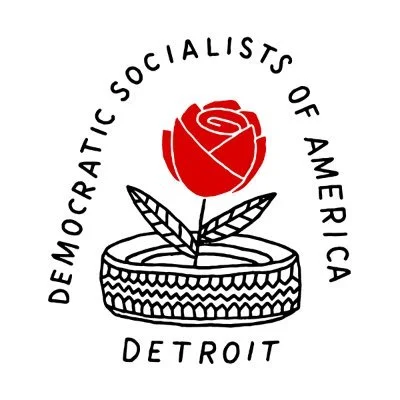

Zohran Won While Leaning into Socialism, Not Downplaying It
By: Jane Slaughter

This article represents the opinion of the author and does not necessarily represent the views of The Detroit Socialist or Metro Detroit DSA as a whole.
A hot take on Zohran Mamdani’s win: Zohran won while leaning into socialism, not downplaying it.
Partly this wasn’t his choice: the media picked up on his DSA membership and hammered him with it. But over the course of the campaign, Zohran actually became more outspoken about being a democratic socialist as he went along, far more than just having the DSA logo on his literature.
Does this mean that the million New Yorkers who voted for Zohran are all pro-socialist? No, but it does mean that they weren’t scared off by Zohran’s allegiance to socialism — and that they appreciated his honesty and forthrightness, his refusal to back off and start using weasel words.
“I am young. I am Muslim. I am a democratic socialist. And most damning of all, I refuse to apologize for any of this,” he said in his victory speech.
That’s similar to Bernie in 2016 and 2020. Bernie’s version of socialism often seemed to be synonymous with the New Deal (so, not actually getting rid of capitalism) — but people appreciated his consistency over the years and, again, his refusal to let the red-baiters back him off.
Around the country, DSA often backs candidates who are kind of progressive but don’t openly identify as socialists. We call their campaigns “socialist” because we’re supporting them, but their platforms aren’t distinguishable from any good-government pol–certainly not rising to the level of the life-changing planks of Zohran’s platform. (Imagine what it would mean for an average family to suddenly be able to get free childcare! To have their rent frozen! To get to work reliably on time! It’s still capitalism, but it does inspire ordinary people to think they matter.)
For me, Zohran’s win means we can be bolder in our electoral runs. We don’t have to hide our socialist light under a bushel. We can lift our constituents’ aspirations higher.
Zohran didn’t talk about the “middle class.” He talked to the working class.
BUILD IT FOREVER
Another crucial point about the campaign (and there are many) is that Zohran explicitly asked his army of volunteers not to just go home and rest after Election Day. “This is part of a lifelong struggle,” he told his volunteers. “Not an electoral one. You have joined a movement for the rest of your life. Now, however you want to be a part of that movement is your decision, just as long as you continue to be a part of it.”
That will be the hard part–convincing tens of thousands of people that they have a part to play in winning the Zohran agenda, and finding meaningful ways for all those people to participate now that the canvassing is done. Not him, us!
Several New York DSAers have floated ideas for how that could happen:
“Rather than disbanding his massive volunteer machine after November 4 — as is the norm in electoral operations — Zohran’s team could transition it into a broader organizing apparatus to help secure his agenda under the banner of a broad new campaign, something like a Movement for an Affordable New York (MANY).” — Eric Blanc, Wen Zhuang and Emily Lemmerman
“We propose the formation of a proto-party like what Mayor Bernie Sanders built in Burlington — a place where tens of thousands of volunteers can go to keep organizing beyond the November election.” — Jeremy Gong and Oren Schweitzer
“A group of unions and community organizations came together to form a citywide alliance called the People’s Majority Alliance — to be ready to go into the streets, to lobby the city council and state legislature, and to keep up the organizing we need to bring a bold agenda into being.” — Stephanie Luce
“This is a great moment to get serious about organizing thousands of workers who want a union and don’t have one.” — Brandon Mancilla
Some of their ideas are more exciting than others. We sure don’t want to replicate the tired formula of an NGO-driven “table” where the heads of nonprofits meet to speak on behalf of their supposed (unorganized) constituents. I hope and assume NYC DSA is aggressively recruiting those who volunteered on the campaign–and will invent creative campaigns both for them and for tens of thousands of other New Yorkers. I stand in awe of their audacity in beginning this campaign and their skill in growing it huge.
Finally, just a quote from Zohran Mamdani, who cited Eugene Debs in his victory speech: “The truth is as simple as it is nonnegotiable: we are all allowed freedom. Each one of us, the working people of this city, the taxi drivers, the line cooks, the nurses, all those seeking lives of grace, not greed — we all get to be free.”
Jane Slaughter is a member of Metro Detroit DSA and a retired Editor for Labor Notes.
Zohran Won While Leaning into Socialism, Not Downplaying It was originally published in The Detroit Socialist on Medium, where people are continuing the conversation by highlighting and responding to this story.
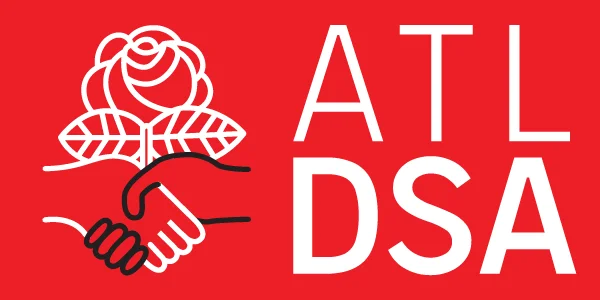

Statement on Kelsea Bond’s Electoral Victory
Democratic Socialist Kelsea Bond was just elected to the Atlanta City Council. Kelsea is a long-time DSA member and organizer. For many years, they have worked closely with local labor unions to expand workers’ rights on picket lines, at sip-ins and community meetings, in marches, and inside and outside of the State Capitol. They have canvassed for reproductive justice and advocated for the City to fund life-saving abortion care. They have fought to Stop Cop City and instead fund public services, build affordable housing, and expand mass transit. Our Chapter is immensely proud of their victory, as well as the work of the hundreds of volunteers and Atlanta DSA members who made this historic win possible.
For months, our members knocked doors and talked to District 2 residents about the issues that matter to working people — affordable housing, green public transit, and an economy for the 99%. The success that came from this massive effort proves that these bread-and-butter issues are broadly and deeply popular — even here in the deep south, even in a city whose government too often bends to corporate interests and the capitalist class.
This people-powered campaign was about standing up to billionaire commercial property owners who aren’t paying their fair share in taxes, and colluding landlords who are jacking up our rent year after year. It was about closing Atlanta’s wealth gap, which is one of the highest in the nation, by fighting for workers’ rights and a guaranteed living wage. It was about protecting the trans and immigrant members of our community, who are under attack by the fascist Trump administration and the Republican-controlled State government.
It was about building greener, more resilient city infrastructure that can withstand climate disaster and make Atlanta a more convenient and affordable place to call home. It was about ensuring that no Atlanta resident is without housing, healthcare, and a truly democratic say in how our city is run. We plan to continue our fight for working-class Atlantans alongside proud DSA member and Atlanta City Councilmember Kelsea Bond this spring, and we’re bringing the movement into City Hall with us.
Help us maintain our momentum and continue our work to make Atlanta more affordable, equitable, and safe for the 99%. This election is only the beginning. From here, we’ll continue relentlessly organizing to build a mass movement for working people.
Get involved today with Atlanta DSA to be a part of this fight, and win the socialist future workers deserve: atldsa.org/organize 


Milwaukee DSA joins city workers in calls for a living wage after years of ravaging inflation
The Milwaukee Democratic Socialists of America (DSA) are joining local union leaders in calling on the Milwaukee Common Council to include a raise for city workers in the upcoming city budget.
The call comes after members of the American Federation of State, County, and Municipal Employees (AFSCME) union working across multiple departments in the city of Milwaukee said they are supporting an omnibus package of amendments that includes a 3% raise for all city workers and a 4% raise for city workers who live in the city, a compromise that will slow the erosion of workers’ quality of life as it fails to meet cost-of-living increases brought on by inflation.
“This campaign is a first step toward obtaining economic justice for some of the hardest-working people in Milwaukee,” Ian Gunther, Chief Steward of AFSCME Local 47, said. “At both of the public hearings on the 2026 budget, city workers gave their personal accounts of how they are struggling to make ends meet while providing critical city services and working on crucial city infrastructure. The members of the common council rely on the labor of DNS employees to take care of their constituents’ issues, yet some DNS employees work a second job just to get by; Milwaukee residents rely on Water Repair Workers to get safe drinking water, and yet only a couple years ago, many of those workers banded together in a sick-out to draw attention to their punishing working conditions and low pay—all this, while the city administration failed to provide any raise in last year’s budget.”
The omnibus amendment to the 2026 budget proposes to give city workers a compromise raise and gives city leaders the chance to pay workers wages near what those same workers made last year, before the most recent round of inflation.
“As a Socialist elected official, my office stands with the workers of the City of Milwaukee,” Alderman Alex Brower, the sole DSA-endorsed member of the Common Council, said. “It’s time for this city to appreciate its workers by giving them a well-deserved raise.”
DSA organizers are asking their members to push their alders to support the raise amendment on Budget Adoption day, November 7.
“While the police demand a 15.75% raise and threaten our city with an invasion by the National Guard, our city workers are asking for the first real cost-of-living adjustment in years,” Autumn Pickett, Co-Chair of Milwaukee DSA, said. “Our workers deserve more: I’m proud of DSA-elected Alderman Alex Brower for his proactive conversations with city workers ahead of the budget process to understand the real needs of our community, and I commend the rest of the budget committee for pushing these raises forward to the whole of the common council. Milwaukeeans are paying attention and will remember any alder who votes against the working people who make our city run.”
Milwaukee DSA is Milwaukee’s largest socialist organization fighting for a democratic economy, a just society, and a sustainable environment. Join today at dsausa.org/join.
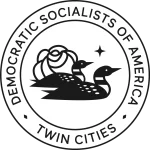

Twin Cities DSA participates in “No Kings” – one of the largest days of protest in US history


Portland DSA Condemns Mayor Wilson’s Cruel Camping Ban, Calls for Investigation into Misuse of Public Funds
November 3, 2025 (PORTLAND, OR) – Portland Democratic Socialists of America (DSA) condemns in the strongest possible terms Mayor Keith Wilson’s decision to begin enforcement of the city’s “public camping” ban, a policy of profound cruelty that criminalizes poverty and will exacerbate the city’s homelessness crisis.
This enforcement begins on the same day that federal SNAP benefits expire for over 15,000 homeless individuals in Multnomah County, stripping them of essential food aid while the city simultaneously threatens them with fines and jail time. Many low-income renters will also risk eviction and homelessness. Rather than offering support and leniency in the face of this federal abandonment, the Mayor has chosen to pile on penalties.
“Mayor Wilson’s decision to unleash the police on our most vulnerable neighbors on the very day they lose their food assistance is an act of stunning inhumanity,” said Chris Olson, Co-Secretary the Housing Working Group in Portland DSA. “He is exploiting a national tragedy to advance a policy of sweeps and cages that we know, from overwhelming evidence, kills people. To call this ‘compassion’ is a lie. It is a deliberate choice to inflict suffering in a misguided attempt to make poverty invisible.”
The Mayor’s punitive approach is further underscored by his recent decision to place the Director of the Portland Housing Bureau — a national expert in social housing — on administrative leave. This move signals a clear rejection of the long-term, housing-first solutions that are proven to work, in favor of a failed strategy of criminalization.
The shelter system remains hundreds of beds short of need, operates with restrictive hours that fail to meet the needs of many, and does not address the root cause of the crisis: a catastrophic lack of affordable housing. This misallocation of funds has directly deprived proven, cost-effective solutions — like direct rental assistance, food aid, and public housing — of critical resources.
“Mayor Wilson promised us he was an innovator,” said Nathan Johnson, Co-Chair of the Housing Working Group in Portland DSA. “Now he’s slammed the door in innovation’s face to insist on the same discredited approach that has given us a continuously declared housing state of emergency since 2015.”
Portland DSA questions the fiscal prudence and underlying motives behind the Mayor’s rushed push for a shelter-based solution. The organization calls on the Portland City Council to immediately launch a formal investigation into whether the Mayor’s office wasted millions of taxpayer dollars to prop up a temporary shelter system that was designed to fail.
“We have serious concerns that public funds were squandered to create a pretext for this camping ban,” said Brian Denning, Co-Chair of Portland DSA. “Did the Mayor waste money on a shelter system he knew was insufficient, just to create a veneer of ‘available shelter’ and justify a punitive crackdown? The City Council has a duty to investigate this potential misuse of taxpayer money. Every dollar spent on a failed shelter strategy is a dollar stolen from a rental assistance program that could have actually kept a family in their home.”
The “Finding Home” report recently published by the Welcome Home Coalition and Sisters of the Road confirmed that 91% of homeless Portlanders need rental assistance, and 65% want to live in a house—not a congregate shelter or a temporary bed. The Mayor’s focus on coercion and criminalization is a direct rejection of what people actually need and want.
Portland DSA stands in solidarity with the unhoused and joins Councilor Mitch Green and community advocates in demanding a radical change in direction. A first step would be passage of the Renters’ Bill of Rights — a landmark set of protections which would stem the deepening houselessness crisis. We must stop criminalizing poverty and start investing in real, permanent solutions: social housing, lowering the cap for the eviction relocation ordinance, universal rental assistance, and low-barrier services that offer a hand up, not a sweep away.
The post Portland DSA Condemns Mayor Wilson’s Cruel Camping Ban, Calls for Investigation into Misuse of Public Funds appeared first on Portland DSA.
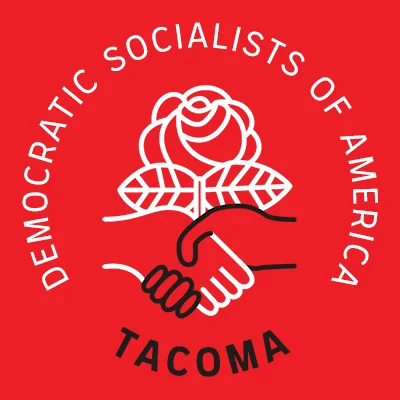

Quilting Solidarity Between Fascist Narratives of Blame
This piece addresses the reactionary threads and narratives of blame, spoken and unspoken, that exploded in the direct wake of the CK assassination. It argues that the marginalized parties that fascists dishonestly blame (for a wide variety of social effects) can find solidarity with one another’s struggles through a critical examination of the rhetorical moves this blame employs.
In the wake of the events of September 10, much has been said about the identities of the two people directly involved. Here I want to situate the event and its consequences in a broader political discourse, based on threads of narratives and events that seem to be revitalized in the week now since the event. On the one hand, the narrative of blame which is explicitly formulated has had an extremely gendered component. As Judith Butler (a queer Jewish scholar of gender who is themself presently under attack from the administration) points out, gender is an overdetermined site, which many social anxieties both cluster around and find articulation through. The language of gender is used, hegemonically, to voice anxiety, and people pushing on the boundaries of normative gender are used as screens upon which to project this anxiety. We can certainly see how many existential anxieties have attached to trans people, which fascists “justify” by invoking the “deviance” of transness: anxieties about things like social order, demographic futurity, normative sexuality, the multivalenced term “safety”, children & their development, the body and its permeability… indeed we have seen many of these anxieties intersecting and amplifying one another in transantagonistic narratives.
Even if we abstract away the question of the perpetrator, the assassination itself represents a severe rupture in hierarchy, and in the ordering of who is supposed to be safe and why. Any violence Kirk incited was meant to play out on other bodies, other flesh. (Indeed, the outsized reaction seems to attest to how unthinkable his death was as a young white conservative man beloved by the regime.) Again regardless of the perpetrator, the intensity and spectacle of the event has offered an opportunity for power to consolidate itself around the production of an enemy who bears responsibility. This narrative production has been able to ground itself in both liberal elegies and in a reactionary constellation of ‘trans’ and ‘antifascist’. To this point, as of writing this, the terms have been fully elided into Project 2025’s recently released info sheet on “trantifa”. These have been the two threads of explicitly formulated narrative formation: 1) the posthumous praise and laundering of Kirk’s figure and 2) the triangulation and amplification of a political enemy. Maga accomplishes this latter move by reaping the already-sown seeds of anxieties projected onto and through gender, and by having rhetorically associated trans people with threat through many vectors.
At the same time that there is this narrative above the surface, I want to also suggest that there is a parallel narrative of blame. This parallel narrative is, as yet, running beneath the level of formulation– it is not explicitly spoken– and we instead have seen it play out in direct political actions that have as their basis racialized violence. I am thinking here about the bomb threats that targeted HBCUs immediately following the shooting, despite there being– and remaining– no connection of any suspects to HBCUs. I am thinking of the opinion writer who was fired for merely being a Black woman and quoting Kirk’s own words on Black women. I am thinking about the 18 year old Texas college student who was arrested and expelled, images of her arrest and mugshot rapidly populating the internet. I am also thinking of the early reports of mysterious hangings of black and homeless men in Mississippi, from the week following the shooting. Each of these stories, of course, become spectacles in themselves of racialized violence for the American appetite. Of course we know that the founding gesture of the formation of the United States is a program of racialized violence called genocide; we know, too, that the foundation of all the capital accumulated here is the brutality of slavery. Racialized violence is our national unaddressed symptom, recurring and recurring because we have not made real conditions to heal it.
What I want to suggest with this piece is that there is an (at least) double motion of gendered and racialized blame and reaction happening in the wake of September 10. I want to argue that this multiple articulation displays the intimate solidarity between all groups scapegoated and targeted, explicitly or implicitly, as threats to (white supremacist) order. This “threat to order” is both the basis of our targeting, and the potential strength of our solidarity. The specificities of the order that is being enforced are written over and over in this country’s history, and we continue to see its living edicts today in the racialized and gendered violence that unfolds in front of us – in the media, in hateful chats, in bomb threats to HBCUs, on the streets in traffic stops, at the detention center just down at the port. In light of that I want to invite us to think together about the question of how to frame and use this moment, and any coming moments like it, for the necessary project of solidarity. How can we build new relationships in principled rejection of what Kirk stood and advocated for, in principled rejection of the logics of gendered and racialized violence that his assassination has been recruited to justify, in principled rejection of the nationalism coalescing around his figure? This seems to be the task before us, and it is imperative we do not imitate the Democrats’ cowardly collapse into silence or forced honor for this man who wanted so many of us dead, and who is now, instead, himself dead.
by Caitlin Murphy


Hidden history of nuclear weapons written in unacknowledged victims

This August marks 80 years since the United States detonated two atomic weapons over Hiroshima and Nagasaki, Japan.
This gets a lot of attention in history books and the media, as it marks the end of World War II and the United States’ ascendance to nuclear superpower status.
But a little-known fact, not featured in textbooks and media, is the sheer number of unnamed, unacknowledged people who suffered the consequences of the Atomic Age.
One example: 70,000 Koreans were victims of the bombings. After the Japanese Empire colonized Korea, hundreds of thousands of people were forced to work in mines and factories in places like Hiroshima and Nagasaki during wartime. Estimates state that about 30,000 Koreans in those cities survived the initial blast.
The U.S. government has never offered acknowledgment, apology or recompense. Survivors and their descendants continue to press the U.S. and Japan for justice and recognition.
I recently visited Hapcheon, South Korea, to attend events commemorating these victims. Because of the many bomb survivors and descendants living there, Hapcheon is called the “Hiroshima of Korea.”
While the bombings happened long ago, the residents of Hapcheon continue to live with the fallout. Exposure to acute radiation breaks apart strands of human DNA, literally shredding the building blocks of life. Atomic bomb survivors, and as many believe, their children are many times more likely to develop cancers, specifically thyroid cancer and leukemia, than the general population.
I first learned of the plight of the Korean A-bomb victims after a delegation visited Seattle in 2023. Early this year, another delegation, including first-generation survivor Park Jeong-soon, 92, shared their pain and desire for a formal U.S. apology. Park will be a plaintiff in the 2026 International Peoples Tribunal on the 1945 Atomic Bombings, in New York City.
During my time in South Korea, I heard testimony at the Korean National Assembly from nuclear-impacted communities from around the world, including the Navajo Nation (Diné Bikéyah), the Marshall Islands, French Polynesia, Kazakhstan and the Democratic Republic of the Congo. Representatives spoke of the intergenerational effects of radiation exposure and “nuclear colonialism.”
The testimony highlighted yet another untold story — that of the Congolese. The Manhattan Project, the huge undertaking to build the world’s first nuclear weapons — which enriched uranium and produced plutonium at facilities in Hanford and in Oak Ridge, Tenn. — was supplied with uranium from the Belgian-colonized Congo in central Africa. The Belgians were notoriously brutal overlords. In a mine called Shinkolobwe, Congolese people were forced to mine some of the purest radioactive uranium ore by hand, with no safety protection. Birth defects and severe illness are still recorded in the communities near the mine.
Under a campaign of secrecy, Shinkolobwe claimed the first victims of the nuclear arms race. Miners and residents died of radiation exposure. The United States attempted to distance itself from the atrocities committed there by claiming that the uranium from the Manhattan Project came from Canada, but the vast majority came from Shinkolobwe. There are more victims of nuclear weapons than we can possibly imagine.
Meanwhile, the NewSTART nuclear arms control treaty, which caps the deployment of U.S. and Russian strategic nuclear arsenals, expires in February 2026. The Trump administration has yet to appoint a negotiator or enter formal negotiations, and despite Washington state being home to over 1,000 deployed nuclear weapons, only two lawmakers from our state — U.S. Reps. Pramila Jayapal and Adam Smith — have signed on to H.Res 100, expressing alarm at the impending expiration. The U.S. has said it plans to spend over $1.7 trillion on new nuclear weapons in the next three decades. Nuclear weapons, nuclear production and nuclear testing are a war waged in the bodies of its victims through generations, and in the environment at places like Hanford and Chernobyl. Our leaders must do more to prevent another Hiroshima, another Hapcheon and another Shinkolobwe.
Sean Arent: is the Nuclear Weapons Abolition Program manager for Washington Physicians for Social Responsibility and coordinates the regional Northwest Against Nuclear Weapons coalition. He lives in Tacoma.
by Sean Arent
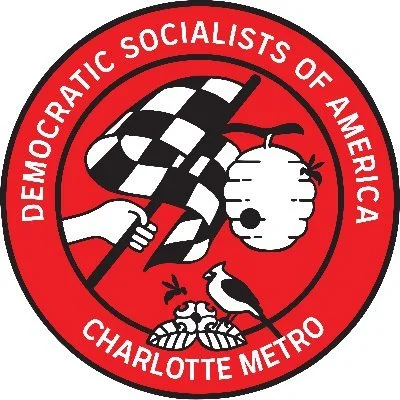

Vote Against the 2025 Mecklenburg County Sales Tax Referendum
Charlotte Metro DSA will not endorse the one-cent sales tax increase as we do not believe the framework created under the PAVE Act will adequately reflect the concerns of working families dependent upon public transit. As written, lower-income communities will face the highest cost burden given the regressive nature of sales taxes while Mecklenburg's capitalist class and political outsiders will be overly represented under the newly created 27-member Metropoitan Public Transit Authority (MPTA). Given this, we believe that any future projects will prioritize public transit not as a vehicle for connecting people but rather to enrich developers. In addition, the 60-40 allocation, 40% for roads, 40% for rail, and 20% for buses, intentionally divides communities by limiting where investment will go. Eastern Charlotte in particular loses out the most while North Charlotte will receive much of the immediate benefit under the planned Red Line. Charlotte Metro DSA believes that public transit investment should serve the working class without strings attached. The PAVE Act represents the deeply cynical nature of North Carolina state politics, in which politically-aligned business interests pollute legislation with obvious poison pills aimed at burdening workers and dividing communities.
Charlotte Metro DSA believes that public transit investment should serve the working class without strings attached. We are building a mass organization of the working class to fight and win key reforms like a fast and reliable mass public transit.
Sound good to you? Then join DSA Today!
In Solidarity,
Charlotte Metro DSA
You can view our Resolution from the 10/2025 General Meeting Here which authorized this post.


Gerrymandering for Good?
California DSA (CA DSA) has recently voted in favor of supporting Proposition 50, a proposal to redraw California’s districts that is aimed at creating enduring structural Democrat electoral supremacy in California. We strongly dissent from this endorsement and reject its strategy, lay out a rebuttal to the argument for the endorsement of Prop 50, and, most importantly for DSA members, analyze what this debate reveals about the issues within CA DSA itself.
What Does DSA Stand To Gain from Prop 50?
In a piece laying out the argument for CA DSA’s endorsement of Prop 50, Chris K. relates Prop 50 to Republican gerrymandering efforts in Texas, which he calls a “calculated assault on democracy” and “the Right’s most powerful weapon for locking working people out of politics.” While he claims to have “no illusions about the [Democratic] party establishment and what it wants out of this,” he argues that gerrymandering can be used in California as a counterweight to Republican gerrymandering in Texas and in other red-states. However, this illustrates the defining political error of CA DSA and those within the organization that would back this proposal: mistaking the goals of the Democratic Party for the goals of DSA.
Prop 50 makes perfect sense from the Democrats’ perspective. Of course Democrats want to minimize Republican footholds and shape the American political map in ways that maximize the electoral power of their (shrinking & demoralized) base. To lend our endorsement to a measure designed in their party’s interest, not ours, is to sacrifice our independence and organizing efforts without gaining any leverage.
Indeed, if we truly have “no illusions” about what this is, then we must admit it is very likely that Governor Gavin Newsom is using this redistricting process to engineer mid-layer support for his 2028 presidential campaign. Prop 50 provides him and his allies with another mechanism for consolidating their networks of patronage, rewarding loyalists, disciplining the working class, and structuring the political field to his benefit. Indeed, the CA Dem website itself says that the redistricting is designed to gain Democrats 5 more seats in California, and those seats would be in districts that Newsom helps draw. Why align with that now unless we aim to be junior partners in the Democrat presidential campaign in 2028? But the junior partner strategy has been shown repeatedly to backfire against us, as most recently shown in the Democrat’s refusal to support a DSA-backed candidate in Minneapolis, because we consistently see the Democratic party strike against us as soon as we pose a threat.
In his piece, Chris K. states “this moment gives us a chance to both take a realpolitik move to reduce the GOP advantage from Texas gerrymandering and to agitate and push beyond the rigged two-party system,” but this point raises more unsettling questions than answers. How can we simultaneously be agitating against a rigged two-party system while supporting one of the parties rigging it? Chris also suggests that we demand more fundamental reforms in CA such as proportional representation, which gerrymandering is designed to decrease. Such contradictions between our rhetoric and our endorsements will not be lost on the working class of California, especially those who’ve been desperate for a true left-wing alternative to the business elites managing both major political parties.
But let’s also be clear on what we’re advocating for: if DSA wants to credibly demand an expanded democracy, our demand cannot be for “fair” electoral maps under capitalism, an idea which itself is based on very narrow liberal assumptions of political rights. It must be for a new kind of political system entirely — one in which workers control their workplaces, communities, and governments directly, not one in which capitalists shuffle district lines to their advantage.
How Our Experience in the Central Valley Shapes Our Position
North Central Valley DSA (NCVDSA), a small chapter which organizes in four counties throughout rural California, has experienced steady growth since 2022, which it owes to working class Californians who reject partisan divides in favor of class struggle. The palpable disdain for both Democrats and Republicans can be seen both within and beyond the electoral context, and there is a critical demand among rural Central Valley workers for an alternative to the capitalist two-party duopoly. In 2024, dozens of NCVDSA members participated in the CA DSA ARCH campaign, canvassing voters who spoke of the hardships they’ve faced for generations; astronomical rent increases, abandoned public transportation projects, extreme land subsidence, unbearable drought, unbreathable air. These attacks on Central Californians are bipartisan, conducted by politicians who switch-hit between D and R on a whim. Many NCVDSA ARCHers felt like we were fighting on two fronts: convincing our neighbors that, while not a panacea, some proposed pieces of legislation (e.g. raising the wage) are an important tool to help the working class, while at the same time convincing them that we were not sent by the Democrats, which would have instantly lost us credibility.
Being forced to support Prop 50 sets back the progress we’ve made throughout California by showing up as an alternative to the capitalist two-party system and developing a level of trust and participation among our working class peers. Rejecting an endorsement of Prop 50 does not mean ignoring the real frustrations people feel about Republican gerrymandering. On the contrary, it is an opportunity to connect those frustrations to a broader critique of capitalist politics. We can explain to workers why both Democrats and Republicans manipulate district lines, why neither party is invested in their empowerment, and why only socialist politics can deliver real democracy. The campaign to support Prop 50 loses sight of our broader political horizons and the opportunities that are truly before us to engage and agitate around a socialist agenda rather than an agenda that aligns neatly with the Democratic leadership.
California DSA’s Fundamental Political Error: Identifying the Democrat’s Goals with DSA’s Goals
CA DSA seems to be operating on the premise that the current primary contradiction in the United States is Trumpism, and the primary task before us as DSA is to stymie Trump. But we cannot absorb such a myopic view of the struggle between capital and the people: Democratic capital cannot save us from Republican capital and we cannot organize the working class through building the personal brand of Gavin Newsom. Our organizing work throughout California’s East Bay and Central Valley regions has made it clear to us that DSA must win the support of the working class regardless of party affiliation or lack thereof.
The mission of DSA as an organization is not to push the Democrats into action to defeat the Republican Party. Our class enemies are just as powerful within the Democratic network as they are within the Republican side – in fact they are often the same people – and losing sight of class contradictions is a huge political error. Our mission is instead to organize the broad working class and win political power on their behalf and with their support. It is not possible to achieve this goal by playing by the partisan rules of today’s political system.
What Would Organizing the Broad Working Class Look Like?
Last year, only 34% of California’s eligible voters voted for the Democratic presidential candidate. If we aim for a strategy that alienates the near supermajority – 66% – of eligible voters who didn’t vote Democrat, then we will forever limit our horizon to being a minor advocacy group in the Democrat orbit. It’s our responsibility as scientific socialists to assess the political terrain objectively, and be ready to make new alliances that upend the existing balance of forces. DSA chapters in California and throughout the country are learning how to organize people who oppose the Democratic Party, and supporting Prop 50 would present a significant setback to this work.
Imagine, instead of endorsing Prop 50, DSA aimed at agitating along class lines, communicating simply and clearly that both Democrats and Republicans are rigging the electoral system and disregarding the working-class. We could point to how working-class communities of color, immigrant neighborhoods, and rural towns alike are carved up by politicians at the peoples’ expense. We could argue that true representation will never be achieved through bourgeois redistricting, but through building worker-power independent of all capitalist parties. We could use this moment not to strengthen the Democrat hegemony in California, but to destabilize it, and to create openings for DSA to present an alternative.
Segments of the working class correctly view the Democrats as failing to fight back against Trump in any meaningful way, but simply fighting Trump to gain electoral ground without actually addressing the demands of the working class. We propose that DSA’s most effective strategy will be to lead with our popular socialist agenda, and explicitly reject Democratic party priorities – such as gerrymandering more seats for Democrats – that do not represent a mass working class constituency.
It’s worth emphasizing that the issues we find with Proposition 50 is not much to do with the principle of using tactics to undermine one’s class enemy. In fact, we recognize that antidemocratic measures are sometimes necessary, especially in revolutionary scenarios! But antidemocratic measures should be targeted squarely at the capital class, not against a broad political/social brand that many of the working class aligns with by normative default. Put simply: if people see DSA associate with a Democrat-coded move to disenfranchise them, they’re likely to write us off as yet another Democrat NGO, even if they would agree with the actual policies we have led with in the past, such as the ever-popular Medicare-for-all. Polarizing your potential base against your policy platform because you can’t see beyond the current identitarian alignment of party politics is a grave political error, and one that we should have learned to stop making long ago.
What this means for California DSA broadly
California DSA’s arguments for the Prop 50 endorsement repeat a common pattern that highlights the dysfunction within the body. It’s hard to find anything but an uncritical acceptance of myopic Democratic partisanship. In the rebuttal to the authors’ earlier piece in California Red, CA DSA leader Fred G. asserts that a position against DSA endorsement of Prop 50 is equivalent to aligning with right-wing billionaires, and that the Republican party is fascist without qualifiers, with all the implications that term carries. This binary style of thinking heightens the polarization of the political choice at hand and makes it seem like there are only two options – either support Democrats or support Republicans – and this rigidity leads to self-marginalization in the long term. The Republican program is highly anti-social and destructive, but if we can’t stand shoulder-to-shoulder with workers who have voted Republican in the past, we are bound to lose.
In addition to that section of the working class, there are many who have voted Democratic in the past but have ceased doing so because the Democratic party leadership is increasingly out of step with their own progressive values. At the national level, most Democrats who refused to vote Kamala Harris did so out of a justified anger at the Biden/Harris administration’s support for the Israeli genocide of Palestinians. Aligning ourselves with the Newsom administration means aligning ourselves against the most progressive Democrat voters who have historically constituted much of DSA’s base and have increasingly begun to stray from the party.
The only way to break through the current partisan alignment is to break off the working class element from both parties, and that strategy cannot be taken when we ally with one party against the other.
As DSA SF’s Hazel W recounts in her Reflections on California DSA, CA DSA was born out of a cross-chapter effort during the Prop 15 campaign (taxing commercial real estate to fund public education), with hopes that it would evolve into a lasting infrastructure for coordination, chapter growth, and statewide strategy. California DSA was meant to be broadly representative, but rather than serving as the connective tissue among a statewide web of chapters, it is increasingly disconnected from them. CA DSA’s stated goal of uniting & strengthening California chapters has remained unfulfilled, and Prop 50 represents a further step back.
With only two chapters – East Bay DSA and DSA-LA – represented on its 2025-2026 State Committee, California DSA is far from representative of California, and is in fact a shell of a body increasingly reflexive to DSA-LA’s politics: according to the records the authors have seen of the ‘24-25 state council, DSA-LA’s delegation constituted close to a majority of the body – 30 DSA-LA delegates vs. 37 non-LA delegates. CA DSA uses a misleading framing of its statewide endorsements, political messaging, and campaigns as broadly representative of California chapters’ politics with little substantive input from inland, rural, or lower-density regions. With less than a week to go until election day, only six California DSA chapters/OCs have taken up the Prop 50 campaign, representing only a quarter of the DSA chapters and OCs in California.
As a general warning sign of the health of the formation, it is unknown to the authors whether California DSA is quorate according to its bylaws, which outline the quorum conditions as: “One or more delegates representing 50% plus one (1) of the local affiliates shall constitute a quorum, provided there be a minimum of one-third (1/3) of the registered delegates present at the meeting.”
Since we know that several California chapters do not participate at all in CA DSA, it is an open question to us whether these CA DSA quorum conditions are being met during deliberation sessions. In order to know the answer, we’d need access to attendance records, but attendance is not recorded (or at least is not made public). As a general rule, delegates change over annually and chapters aren’t required to send delegations, so it is very possible that CA DSA has gone out of quorum in the past. This is not a technical quibble; it is a sign that there is a trend among California chapters to withdraw energy and consent from a state formation that can’t justify its existence.
Hazel W raised alarm bells of dysfunction earlier this year, and the disconnection between the State Committee and individual CA chapters has only deepened, further eroding the legitimacy of the body. The ambition in the founding vision to facilitate skill-shares, seed new chapters, or liaise with YDSA never took root in a meaningful way, and has instead given way to CA DSA leaders deriding the growth of rural California chapters and its cochair attacking comrades as “fascist collaborators” for expressing concerns about Prop 50. None of this helps us with the formation’s stated goals of “unit[ing] and in unity strength[ing] the power and influence of its affiliated locals”.
CA DSA has become an endorsement shop that focuses on high-visibility, low-leverage endorsements, and fails in its attempt to portray itself as representative of a broad consensus among California chapters. If CA DSA can issue endorsements on legislative propositions across the state but overwhelmingly reflects the political views of only a small percentage of the state’s chapters, then what value is the formation really adding to our project?
We call on chapters throughout California to reckon with whether California DSA is representative of their politics. If the State Council cannot be made functional, transparent, and responsive, chapters have a responsibility to intervene, including by pulling delegations. The state body must prove it has the support of California chapters in the form of quorum by publishing its delegation attendance records, and it must cease hollow top-down campaigns in favor of amplifying the work that chapters are already doing.
If California DSA cannot reform, it risks becoming a redundant progressive NGO that insists it speaks for California chapters, while it undermines the work those chapters are doing. We must knit together the work that has actual support at the chapter level, not impose political priorities on chapters with an email list. California DSA must reset, or we’ll continue to waste time and energy on lending symbolic consent for the Democratic party’s priorities.
Image: LA County Sample Ballot for Prop 50 in the 2025 Special Election. (Public domain)

